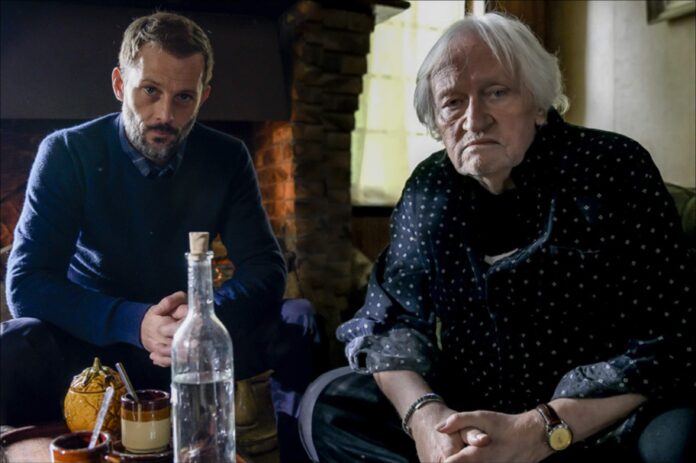Created, directed and written by Olivier Abbou and Bruno Merle, Black Butterflies (Les Papillons Noirs) represents the enveloping darkness of the human psyche. The black motivations of the human heart may not be understood entirely, and that is what the story symbolises. Adrien (Nicolas Duvauchelle), who goes by the pen name of Mody, is the renowned French novelist at the centre of the madness. Once addicted, disturbed, violent and incarcerated, he has seemingly left that life behind to dedicate himself to the written word. There’s just one small problem. Writer’s block has left him restless and uneasy. Nothing good has come his way since his last successful book.
An elderly stranger’s request to ghostwrite his memoir is taken up without a second thought. Slowly but surely, Adrien gets drawn into Albert’s (Niels Arestrup) intense tale of love that begins after World War II. Solange (Alyzée Costes) was Albert’s soulmate from when they were children, the old man claims. Solange’s mother was a prostitute who was publicly shamed for her association with the Nazis. Albert defends Solange from verbal and physical attacks at school as they bond over their respective circumstances. Cut to the 70s, and the duo is running a small salon with a stream of regular clients. A fateful day at a deserted beach turns from romantic to violent quickly as Solange kills a man in self-defence – a man attempting to rape her. Albert kills his brother, who tries to make a run for it. The incident sets off a chain reaction, with the couple doing short trips across the French Riviera, actively seeking out men (bad ones, for the most part) who eventually force themselves onto Solange…with Albert stepping in to murder them. Turned on by the justice being meted out vigilante style, their modus operandi is to have sex in the bloody crime scene minutes after.
Creators and Directors – Olivier Abbou, Bruno Merle
Cast – Nicolas Duvauchelle, Niels Arestrup, Alyzée Costes, Alice Belaïdi, Sami Bouajila
Streaming On – Netflix
There is a moment early on when Adrien storms out of Albert’s home, not able to believe a word he’s just heard. The usual questions of how and why aren’t met with convincing replies. “It was the 70s…There was no DNA analysis back then” and answers to that effect don’t have Adrien sold. He feels he’s been taken for a fool, been manipulated by a trickster into writing his incredulous story for him. But when he digs through the archives and corroborates an unsolved murder, he can’t shake off the feeling that this serial killer love’ story is as bizarre as it is true. This magnetic pull of the abyss, no matter how much Adrien runs from his past, is the underlying theme of the French show.
Black Butterflies also explores the complexity of the searing creative mind. At first, Adrien’s curiosity is piqued by Albert’s crazy admissions. But when it gets to the part where it’s all adding up to an engaging story, it is hard for him to not want that piece of writing for himself. The truth be damned, Albert’s memoir be damned, a novel like this could get him back on the literary landscape. His epigeneticist girlfriend, his publisher, they’re all in the dark about its origin. The only thing he keeps hearing is that he’s got a great book on his hands. Adrien, for all the outward bravado, is but a few steps away from being consumed by his artistic and human fallibility.
Though not without flaws, the show’s characterisation is what hooks you. The slow burn technique used through a majority of the first half has the character development to thank for all the initial engagement. Albert justifies his actions with some warped moral code (that the men were rapists and they deserved what they got). There is even a scene in which Adrien tells him about his nine-month incarceration when he maimed a man outside a bar for harassing a woman. When Albert likens their characters, the former is quick to shut him down. “We’re nothing alike,” he says. This bad men trope runs deep into the heart of the story, with Albert and Adrien using it to justify their own violent response to different circumstances. A scene involving Nora (Alice Belaïdi) and Adrien, the latter in a state of psychological and emotional freefall, has him assaulting Nora’s male colleague when they hug after a work trip. She confronts him about his deeply problematic saviour complex and his all men are predators and assaulters hypothesis.
There are some connections that are impossible to take at face value in Les Papillons Noirs. A discerning analysis of the onscreen happenings will tell you as much. While some twists work in the narrative’s favour, spinning the standard serial killer genre on its head, others fail to impress. Lots of unnecessary melodrama three-quarters in takes away from the initial build-up of intrigue the show excels at. Replacing the original actress who plays Solange (Alyzée Costes) for a different person altogether (due to revelatory character information surfacing), changes perception in the worst way possible. Granted that Solange is drawn up in Adrien’s head (I would guess) as Albert recreates their past, but even then, the switch ought to have been done away with. With morally skewed central characters who are too damaged for redemption, Black Butterflies presents human behaviour in its darkest form. The opening scene that the makers keep circling back to time and again alludes to the overall, deep-seated dysfunction the show stands for.
#Black #Butterflies #Series #ReviewExcellent #characterisation #buildup #dark #flawed #sho #Cinema #express

